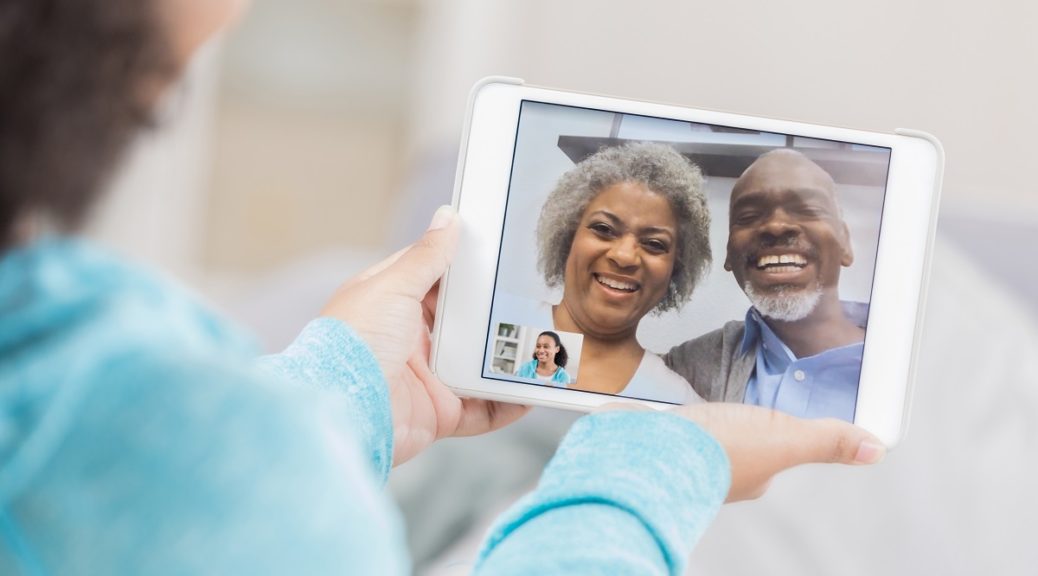How Grandparents Can Support Grandchildren, Ease Coronavirus Concerns

Social distancing is a major aspect of stopping the spread of Coronavirus (COVID-19) and “flattening the curve.” As humans, we thrive on emotional and social connections—so this distance from our loved ones, friends, colleagues, and other support systems can be very challenging. For kids and teens, socialization is an important part of their lives and critical developmental stages. In this blog, we share examples of how grandparents can support grandchildren and help them overcome some of the difficulties around COVID-19.
 Fred Watts, LCSW, LSCSW, Senior Clinical Consultant at Camber (previously KVC Hospitals), has put together the advice below for how senior generations can support our younger generations during social distancing. He gives examples of how grandparents can stay connected with their grandkids, help them build their story of overcoming, and give them hope.
Fred Watts, LCSW, LSCSW, Senior Clinical Consultant at Camber (previously KVC Hospitals), has put together the advice below for how senior generations can support our younger generations during social distancing. He gives examples of how grandparents can stay connected with their grandkids, help them build their story of overcoming, and give them hope.
Watts has more than 40 years of experience as a social worker, 35+ years as a father, and seven years as a grandfather to three boys. He is experiencing the impacts of social distancing firsthand, as he and his wife are quarantined away from their children and grandchildren to help keep everyone healthy. Keep reading for all of Watts’ advice!
How to Set the Tone for the Rest of Your Family:
- Actively listen—hear others out. Listen to others, especially children, and give them your full attention and focus. Show them that you want to understand what they are feeling. This does not happen when we are only considering our own opinions, so it is important to go into each conversation with an open mind. You might even discover a new perspective you had not considered.
- Check-in with your adult children. Listen to their fears and concerns. Educate them with information from credible sources like the Centers for Disease Control and Prevention (CDC) and the World Health Organization (WHO). They have a lot on their shoulders—they are cooped up in their homes; trying to work while parenting with no school or childcare services; worried about finances, and they do not have a sense of when this will be over. Validate their feelings and give them hope that we will get through this. Give them some examples from your life of experiences that were scary, but with time we got through them together.
My Tips for Staying Engaged with Grandchildren & Giving Them Hope:
- Keep in mind what the years of our lives are made of—Stories. Stories of where we come from and the people who have been part of our experiences. These stories make us who we are today. Also, remember that humans are social beings. We evolve, grow, and mature through the relationships we have around us. As grandparents, we are a part of the relationships that will guide the future of our grandkids and they will be proud to have you as part of their memories. My grandfather served in World War I, and of that, I am truly proud, and it is part of my story. Share the stories that make you who you are—and teach your grandchildren how to share their stories.
- Find age appropriate ways to engage with your grandchildren, create their stories. Keep infusing yourself into their lives through the appropriate social distancing but get creative. Be part of the story they will tell one day. And remember, age is important to consider for how you engage.
-
- Ages 4 and younger: Children in this age range are too young to understand what is happening in the world right now, but they can feel a difference in their environment. Keep the focus on making them happy and filling them with laughter. Last night, my wife and I sent a video to our young grandkids singing, “we miss you kids, oh yes we do.” Take my word for it, my singing is very laughable! You can also do simple things with them like teaching handwashing and following a routine or schedule like they are used to from daycare or school.
-
- Ages 5 to 10: Kids this age likely have more of an idea of what is happening but too much detail can be difficult to understand. As grandparents, what we can do for them is to validate their feelings and give them someone to talk to. Try to set up some scheduled phone time or use video tools like Facetime or Skype to see each other’s while you talk. Share stories with them from your past, give them examples of when you went through a difficult time and got through it. Also, tell them about things that comforted you while growing up. I have an early memory of chasing my grandparent’s dog “Fluger” around the back yard. Sharing stories like these help take children’s minds off the stress of the moment and relate with you in fun ways.
-
 Ages 11 and up: They may be having some serious worries. Make sure you and their parents are checking in with them often. This will be a really difficult time for these kids because, at this point in their life, socialization has really ramped up. They will be missing friends, parties, ball games, first dates, graduations, and more. Acknowledging this is important along with giving them a sense of, “This will pass.” Use text messaging to check in every now and then and say something like, “Thinking about you.” Technology, while not always easiest for some of us, allows for creative ways to stay in touch. Be flexible but smart in letting them connect with others. With anything, limits are necessary, but playing video games or talking on the phone/texting will be a valuable escape for them during this time.
Ages 11 and up: They may be having some serious worries. Make sure you and their parents are checking in with them often. This will be a really difficult time for these kids because, at this point in their life, socialization has really ramped up. They will be missing friends, parties, ball games, first dates, graduations, and more. Acknowledging this is important along with giving them a sense of, “This will pass.” Use text messaging to check in every now and then and say something like, “Thinking about you.” Technology, while not always easiest for some of us, allows for creative ways to stay in touch. Be flexible but smart in letting them connect with others. With anything, limits are necessary, but playing video games or talking on the phone/texting will be a valuable escape for them during this time.
We as grandparents, along with our parents and their parents and so on, have all lived through difficult times (World Wars, other pandemics, Great Depression, 9/11, etc.). Let your grandkids know they are not alone in this and that with time, this will also pass.
Remember, you are helping your grandchildren construct a story of who they are and how they got there. Help them prepare their story and how they will one day share with future generations the ways they persevered through the Coronavirus pandemic.
The Impact on Children’s Mental Health
While you connect with your families, remember to ask them how they’re doing. Ask them what emotions they’re feeling and to describe those feelings. Let them know that it’s okay if they are feeling things like sadness, fear or anger. It’s important that their feelings aren’t minimized and that they feel comfortable opening up.
About Camber (Previously KVC Hospitals)
For 30 years, Camber has helped thousands of kids and teens achieve mental health wellness through expert and compassionate treatment. Camber uses a patient-centered approach that works to heal the whole family unit when a child is struggling with depression, anxiety, suicidal thoughts, self-harming, the impacts of trauma, and other mental health needs. To learn more about our services including our internationally renowned expertise in trauma-informed care, visit cambermentalhealth.org or call us 24/7 at 913-890-7468.




